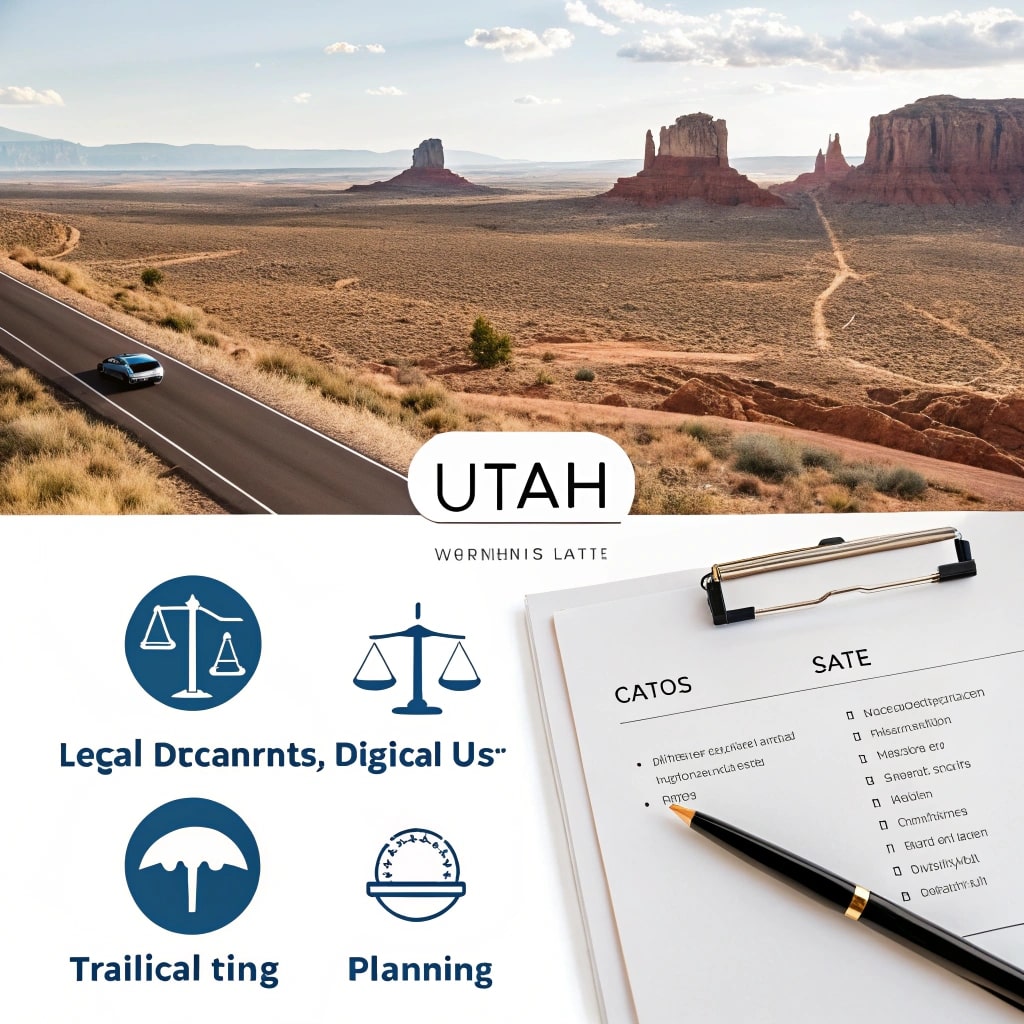You’re likely not thinking about probate right now, but it’s better that way.
As an individual or business owner in the state of Utah, creating a comprehensive estate plan is essential to ensure your wishes are respected after you’re gone. Probate can be a costly and time-consuming process for loved ones.
By taking proactive steps today, you’ll have peace of mind knowing that your legacy will remain intact for generations to come.
In this in-depth guide, we’ll walk through the crucial elements of estate planning – including traditional methods like trusts, powers-of-attorney and digital strategies such as creating a Last Will & Testament.
What is Estate Planning and Why it Matters
Estate planning is a crucial step in securing your future, and it’s especially important if you’re living in Utah. It involves creating a plan for how assets will be distributed after your passing, ensuring that wishes are respected and minimizing conflict with family members or the state.
This process helps to avoid probate, which can be time-consuming and costly. Probate is when a court oversees the distribution of an estate, often dragging out the entire process by several months or even years. By having a clear plan in place, you can ensure that your assets are distributed according to your wishes, without unnecessary delays or disputes.
A comprehensive estate plan should include both digital and traditional elements. This means considering how to manage online accounts, social media profiles, and digital assets such as computers, phones, and websites. It also involves planning for the distribution of physical property like real estate, vehicles, and personal effects.
In Utah specifically, having a clear understanding of state laws can help you navigate the process more smoothly. For example, did you know that Utah has a relatively straightforward process for probate? However it’s still crucial to consider other factors such as tax implications and charitable giving during your planning.
Creating a Lasting Legacy – Unique Strategies to Consider

When we think of estate planning, our minds often wander to funeral arrangements and dividing up assets.
But there’s another important consideration that can make all the difference – probate. The last thing you want is for your loved ones to have to deal with costly and time-consuming legal battles over what’s left behind after you’re gone.
Utah’s latest estate planning laws offer a way out of this nightmare, giving families peace of mind as they move forward.
So how can probate be avoided in a will? What specific strategies are available for Utah residents looking to protect their legacy and ensure their wishes are respected.
As we live longer, our impact on this world grows.
We spend most of our time and energy focused on the present – planning for today’s meals, next week’s meetings, or just trying to get that one last project off the ground. But what about tomorrow? And 50 years from now?
The truth is, life can be unpredictable (and often is!).
That’s why having a clear plan in place can bring peace of mind and give your loved ones reassurance.
Whether it’s about estate planning, naming guardians for dependents or specifying how you’d like your medical treatment – an advanced directive provides clarity. In this comprehensive guide we’ll walk you through making informed decisions that will have a profound impact on those who are left with all these life choices
Why Your Legacy Matters
Your legacy is more than just a collection of memories and experiences, it’s a blueprint for your future self. It’s what remains after you’re gone, a testament to the life you’ve lived and the impact you’ve had on those around you.
Think about this: every decision, every action, and every moment in time has led up to this point. Your legacy is not just about accomplishments or achievements; it’s also about how they made others feel. Those who knew you will carry your memory with them long after you’re gone, influencing their thoughts and emotions in ways that may never fully be understood.
The question is, what kind of impact do you want to leave behind? Do you want to be remembered for kindness and generosity, or perhaps for innovation and progress?
Consider this: if your family members were to look back on your life today, they would see a person who made choices that brought them joy. Those are the qualities you should strive for in planning out your legacy.
This involves thinking about what kind of world you want to leave behind when it’s all said and done. Do you want there to be more kindness, or less waste? Your legacy is not just about how things looked during your lifetime but also how they’ll look years from now.
The process starts with understanding what matters most to them. So take some time and think carefully about this: What kind of person do I aspire to become? And then build a plan around that vision so you can be sure it’s carried forward even after you are gone.
Types of Advanced Directives for Succession Planning
Did you know that in many countries, up to 70% of an estate can be left untouched by the will due to a lack of planning?
The reality is harsh – when someone passes away without leaving behind a valid last will and testament (also known as intestate), their assets are distributed according to state law.
This doesn’t necessarily mean that your loved ones are entitled, but rather than giving them nothing at all. As an example, they might end up with very little or even nothing if the estate is insufficient.
But there’s hope – understanding how intestate asset distribution laws works can safeguard your inheritance and give you peace of mind.
In this article I’ll cover what happens when someone dies without a will and outline some legal solutions that protect their assets.
Understanding Intestate Succession Laws Around The World
Managing intestate assets can be a complex and overwhelming task, especially when it comes to understanding laws surrounding succession from around the world. If assets left behind after passing away are not properly managed, they may end up being divided according to state laws rather than your wishes.
In many countries with civil law systems like France or Germany, assets go to closest relatives in a specific order – usually spouses and then children. But this can lead to confusion when there is no clear line of descent. For instance, if an asset left behind belongs solely to you, it could fall back on the state.
In common law countries such as the United Kingdom or Australia, things are slightly different. The laws dictate that assets will be divided equally among all eligible relatives. This often results in your hard earned money being split into tiny pieces.
For a smoother experience consider taking steps now to plan out your wishes for when you pass away. You can set up an estate plan outlining how assets should be distributed and take the time to research the laws of their respective countries where applicable so there is no room for confusion or misfortune in case something happens to you down the line.
Assessing Assets for Inheritance Tax Purposes
Managing intestate assets after passing can be a daunting task, but with the right strategies in place, you can ensure your loved ones receive what they need. By understanding how inheritance tax affects different asset types and implementing effective planning, you can minimize potential penalties and guarantee that your legacy is preserved.
When it comes to managing assets like stocks, bonds, retirement accounts, and property after passing away, there are specific considerations to keep in mind. For instance:
- Stocks: A person who holds stock shares in a company might inadvertently trigger inheritance tax if the value of those shares increases significantly during their lifetime or immediately following their death. To avoid this pitfall, consider transferring ownership to children or heirs through trusts, which can help minimize taxes and ensure that your loved ones receive inheritances without undue financial burden.
- Bonds: If you hold bonds with a high face value (i.e., the initial principal amount) when you pass away, it’s essential to determine whether they’re subject to inheritance tax. For example, some types of municipal bonds might be exempt from federal estate taxes or state income taxes depending on their nature and how much interest is earned.
Retirement accounts are another area where careful consideration must be taken. Many retirement account holders are not aware that such assets can trigger an inheritance tax if they’re not handled correctly. For example, if your pension plan has a substantial amount of money at the time of passing, you might need to consider transferring it into a trust or establishing separate trusts for each child’s benefit.
Real estate is another asset type where careful consideration must be taken in order to avoid triggering an inheritance tax. If real estate values significantly during the lifetime or immediately after your death, this could inadvertently trigger taxes on that increase in value. For instance: property with substantial cash flow might lead to higher income and thus may cause a larger amount of inheritance tax.
To accurately determine whether assets are subject to inheritances when passed on requires considering factors like their market value at the time of passing or how much has increased during your lifetime. To help break down these values into categories, you can create a table listing asset types with corresponding dollar amounts and projected appreciation rates for each type of asset.
For your own asset management, check these things off your list:
- Cash and other valuables
- Real estate
- Retirement accounts
By managing your assets properly you can avoid triggering unwanted inheritance taxes on large increases in value of stocks, bonds and retirement accounts. Properly planning for the future will allow you to leave a more substantial legacy.
Identifying Beneficiaries and Creating A Last Will or Trust

To safeguard your heirs’ future after your passing, it’s essential to identify beneficiaries and create a Last Will or Trust. Without one, assets can be left in limbo for years, leading to costly delays and disputes among family members.
Start by gathering information about the people who will inherit your estate: immediate family members, lifelong friends, or charity organizations you support. This step is crucial in ensuring that your loved ones receive what they deserve after you’re gone.
To ensure accuracy, make a list of all assets that make up your estate, including:
- Real property (e.g., homes, condos)
- Bank accounts
- Investments (stocks, bonds, retirement accounts)
- Vehicles
- Jewelry and personal items
Use online resources or spreadsheets to categorize these assets and assign beneficiaries. Consider designating specific gifts for beloved possessions or heirlooms that hold sentimental value.
Next comes creating a Last Will or Trust your roadmap for distributing your estate among the designated individuals. Include any funeral wishes, last instructions for pets if applicable, and specify how you want major assets to be divided upon your passing.
When it comes to wills and trusts:
- A valid will must include a clear list of beneficiaries
- Specify who should inherit specific properties or assets
- Designate a power of attorney with clear expectations
Designating beneficiaries is not just about getting things right; failure to do so can lead to costly delays in distributing assets, which could result in your loved ones losing their inheritance. Don’t leave them scrambling for answers and plan ahead!
Take action today:
- Review your current bank accounts, investments, and personal items.
- Research online resources or consult with an attorney to gain a better understanding of what constitutes a valid will or trust.
Remember, estate planning is not just about the future; it’s also about showing you care for those who depend on you. By taking these simple steps today, you’ll ensure your loved ones receive the love and security they deserve tomorrow.
Avoiding Probate Through Effective Estate Planning
Probate can be a costly and time-consuming process that leaves your loved ones vulnerable in their hands after you pass away. However, with proper planning, you can avoid probate altogether by setting up an estate plan.
To start tackling the issue of probate, it’s crucial to create a comprehensive plan that addresses asset distribution and control. This includes crafting a will or trust document that outlines how your assets are distributed among beneficiaries. Think about gifting certain assets during your lifetime, such as real estate or investments, to avoid probate altogether.
For instance, if you have significant debts on the books, consider setting up an irrevocable trust to shield them from creditors and ensure they’re paid off quickly. This approach also applies when dealing with complex assets like retirement accounts or life insurance policies. Setting up these types of trusts allows your beneficiaries to receive their inheritance without delays.
A living will or advance directive is another essential aspect of estate planning, allowing you to specify how medical treatment should be administered if you become incapacitated. Think about the potential consequences if a court gets involved it can lead to unnecessary costs and stress for loved ones. By creating this document, you’ll avoid these unwanted complications.
It’s also wise to consider trusts for retirement accounts or other valuable possessions that could have serious implications on your beneficiaries’ lives. You might not always want probate-related headaches when they inherit those assets. In fact, setting up such trusts can be a lifesaver in many situations especially if there are multiple beneficiaries with different needs.
By taking the time to create an estate plan and explore strategies like gifting and trust-making, you’ll not only protect your assets from probate but provide peace of mind knowing that your wishes are respected. This way, your legacy lives on with those who matter most.
Navigating Unconventional Heirs such as Pets or Artwork

Inheritance laws often struggle to keep pace with modern circumstances. A key challenge arises when pets or artwork become part of your estate.
Artwork is a significant consideration for inheritors, holding considerable monetary value. As such, there are several ways that you might pass on to them in order to prevent any potential issues with the heirs’ use or sale.
While considering pet ownership, one must consider their place within your will. For example, a study by the American Pet Products Association found that 63% of households include both children and dogs in their home. As such, naming a guardian for pets is crucial to ensure they are cared for after our passing.
Think back to country music legend Dolly Parton. When she passed away in 2020, her estate was worth a staggering $400 million. Her will left it up to her furry friends specifically, three dogs and several cats to receive any unallocated property among the beneficiaries.
Naming guardians or caregivers for pet care and welfare is a crucial step when planning your estate. Here’s what you need to know:
Dogs & Cats | Naming guardians or caregivers for daily needs and veterinary care. Leaving specific instructions on their future use, sale, or donation can also be included in the will.
While estate planning is an evolving field, the complexities surrounding pets and artwork can be daunting. Let’s dive into these scenarios that require special attention.
Managing Real Estate Investments with Intestate Estates
For heirs who are suddenly faced with managing assets after a loved one’s passing without a will (intestate estate), navigate these complex issues. Understanding local laws regarding property distribution in cases where there is no will can be instrumental in avoiding costly disputes and ensuring asset management strategy aligns with the deceased individual’s wishes.
Researching local laws requires more than just browsing online resources; it demands attention to concrete statistics, real-life instances, and reliable sources. Consider this: Did you know that a study by the American Bar Association found that intestate estates can lead to delays of up to 12 months in processing? To avoid such scenarios, focus on finding accurate information from trusted authorities like local government websites or reputable law firms.
To prioritize liquidation of properties most likely to be sold quickly and efficiently, you should also focus. This approach minimizes disputes among heirs through clear title documentation. For instance, if a deceased person owned two properties with different beneficiaries, ensuring each property has a clear title can avoid lengthy court battles over ownership rights.
Additionally, obtaining necessary permits and approvals for any major changes or renovations made to real estate holdings in the intestate estate is crucial. This may involve navigating complex bureaucratic processes like zoning variances or environmental assessments. To make things smoother, consider consulting with local experts who understand these regulations. A failure to do so could result in costly delays similar to those experienced by one Mr. Johnson whose attempt to renovate his deceased father’s home was derailed due to inadequate documentation.
By handling property-related matters properly and obtaining necessary permits, you can prevent costly delays or complications that may impact your ability to manage these assets effectively. Remember, clear communication with beneficiaries and other stakeholders is key in ensuring a smooth transition of ownership.
Utilizing Digital Assets to Preserve Family Heritage
When someone passes away without leaving a will (intestate), it’s not just about dividing up physical possessions; there’s often additional complexity to consider, particularly when digital assets come into play.
In addition to physical items like homes, cars, and jewelry, intestate inheritance can involve navigating the complex world of digital assets. This includes online profiles such as social media accounts (e.g., Facebook or Instagram), where followers may feel a sense of loss or connection after someone’s passing. For instance:
What happens when an influencer loses their audience? Do they lose access to their account, and if so, what are the potential consequences for advertisers who relied on that influencer?
Should digital assets like social media accounts be donated or destroyed? This is a tough question that may require family members to make difficult decisions.
It’s also crucial to consider online storage services such as Google Drive or Dropbox. When someone passes away without leaving instructions, their loved ones might need access to files and documents stored in these cloud-based platforms. However, this can be a challenge:
What happens when an individual leaves behind extensive document collections with sensitive information? Do they simply get deleted?
How do you handle passwords and login credentials for these services?
Moreover, other types of digital possessions might require special consideration in intestate inheritance scenarios. This includes:
- Cryptocurrency wallets or email addresses
- Online gaming profiles (e.g., Xbox Live or Steam) where friends may feel abandoned.
- Subscription-based streaming services like Netflix or Hulu with active memberships.
In summary, managing the various types of digital assets that arise from an intestate inheritance can be a complex and emotionally charged process. However, it’s essential to approach these situations in a thoughtful and organized manner, rather than simply guessing how things should go. By taking proactive steps now, families can ensure that they’re adequately prepared for these challenges when the time comes.
Actionable Takeaways:
- Consider designating someone with power of attorney specifically responsible for managing digital assets.
- Set up secure password managers to keep sensitive information safe from unauthorized access.
- Have an open discussion about how to handle social media profiles and online accounts in intestate inheritance scenarios.
Preserving Private Business Interests after Deceased Ownership
Preserving Private Business Interests After a Passing: A Proactive Approach
To protect your business legacy and ensure a smooth transition, it’s essential to start planning now. Identifying and categorizing private assets as public or private is crucial in ensuring that your heirs inherit what you want them to.
For example, consider the case of Sarah, who owns a small retail store with several employees. When she passes away without proper planning, her business falls into disarray due to disputes among her children over ownership and management. By creating an inventory of assets and consulting with a legal professional, Sarah’s family can avoid such conflicts.
Determining How to Handle Your Business Interests
To determine how you want your private interests handled after your passing, consider the following options:
Naming an Executor or Personal Representative: This involves selecting someone you trust to manage your business affairs in case of your death. You should ask yourself:
What are my child’s skills and experience?
Can I afford a professional executor service?
Establishing a Trust Fund for Business Interests: A trust can provide an additional layer of protection by separating specific assets from the rest of your estate. Consider what type of business you want to include in the trust:
Do you need to protect intellectual property or confidential information?
Setting Up a Probate Process that Prioritizes Private Business Interests: Different probate processes can cater to different situations and asset values. Research and understand which process is best for your unique circumstances.
Drafting a Business Succession Plan: This comprehensive plan outlines the transfer of ownership, management, and structure of your businesses after you pass away.
Key elements include:
- Who will manage each business?
- What are the conditions under which companies can continue operating?
By taking these proactive steps, you’ll provide peace of mind for your loved ones and ensure that your private business interests are protected for years to come.
To take action now:
- Review and update your estate plan with a legal professional.
- Consider establishing a trust fund or probate process tailored to your specific situation.
- Develop a comprehensive Business Succession Plan, outlining the transfer of ownership, management, and structure of your businesses.
Don’t let uncertainty about private business interests hold you back, start planning today!
Tackling Hidden Asset Exposure for Beneficial Inheritance Disputes

Managing intestate assets after someone passes away can be a daunting task, especially when there are hidden asset exposures and unclear ownership situations. In many cases, beneficiaries may discover that their loved one’s estate is riddled with unaccounted-for properties, debts, or other financial obligations.
Conducting a thorough inventory of all the deceased person’s assets is essential in managing these hidden asset exposures for potential inheritance disputes. This process involves reviewing every nook and cranny to uncover any previously unknown accounts or property titles that may have slipped under the radar. To identify such issues, beneficiaries can start by searching online public records for property ownership changes, researching recent lawsuits against the deceased person, and checking old bank statements from the past few years.
For instance, a beneficiary might stumble upon an unlisted account in their loved one’s name with an unknown balance or transaction history. This could be due to forgotten savings accounts, credit card balances that went dormant over time, or even hidden loans taken out by someone else under the deceased person’s name.
Similarly, reviewing old financial records can provide valuable insight into previously overlooked expenses or transactions. For example, a beneficiary may find that their loved one had been paying off debts without telling anyone about them. This could lead to unexpected costs and create disputes over who is responsible for these payments after death.
One potential pitfall of not addressing hidden assets is the possibility of disputes with distant relatives who may have unknowingly inherited property without knowing it. For instance, a beneficiary might find out that their great-uncle’s name was on title for an apartment building, but they had no idea about this arrangement until years later.
To avoid such situations and ensure a smoother resolution of inheritance disputes, beneficiaries should consider consulting with an attorney who specializes in estate planning and probate law. These experts can provide valuable guidance on navigating complex situations like these ones. For instance, if you’re searching for hidden assets in online records, it’s crucial to know how to properly navigate the process without making a mistake that could jeopardize your inheritance.
Think of conducting an inventory like searching for hidden treasures – you never know what valuable insights you might uncover. The key is to be proactive and vigilant about managing intestate assets after death, so beneficiaries can rest easy knowing they’re doing everything possible to avoid disputes and protect their hard-earned legacy.
How Your Heirs Can Breathe Easy Knowing You’ve Done Everything Right
Great probate outcomes rely on open communication from the start. By fostering transparency and trust among heirs during probate proceedings, you can ensure a smoother transition for everyone involved.
And clarity is key when dealing with complex family dynamics. When all parties are in the loop, there’s less room for miscommunication or misunderstandings that could derail the entire process.
So, take proactive steps to establish an open dialogue from the beginning of your estate planning journey and beyond. Make a plan that takes into account everyone’s needs and concerns.
By doing so, you’ll avoid costly delays down the line when emotions run high during probate proceedings. With transparency guiding every step of the way, your heirs will appreciate your thoughtfulness and commitment to their well-being.
Take decisive action today to ensure a peaceful transition for those who depend on you – establish clear lines of communication from now on.
